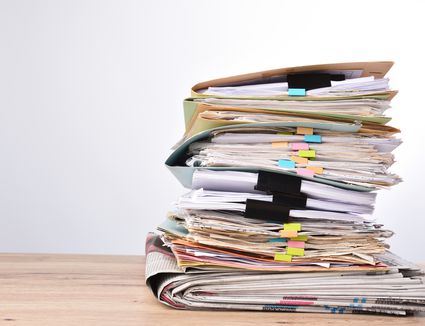March 12, 2025
Categories: Education & Security

By Dawn Kellogg
Even with paperless technology, everyone has documents in their possession that contain sensitive information. Items like bank and credit card statements, pay stubs, receipts, old tax returns, etc. clutter our desks and files. What documents should you keep? Which should you destroy? How best to destroy them?
Why destroy old paperwork?
In today’s day and age, thieves are looking everywhere to find information that could compromise your financial security and identity. Most documents in your possession have some piece of information that is required by law to be shredded. You’ll want to properly destroy old paperwork containing sensitive information so that personal information does not fall into the wrong hands.
By destroying documents containing personal information, you reduce the likelihood of becoming an identity theft victim. The type of document and its content will dictate when it should be destroyed.
Do not throw old documents into the garbage or recycling bins. Did you know that someone can legally dig through your trash once it has been put out for pick up? The U.S. Supreme Court decision in California vs. Greenwood, found that there is no expectation of privacy in trash that is left for collection in an area accessible to the public. That means any document that you put in the regular garbage is available to anyone that wants to look through it.
What documents should you destroy?
Basically, anything containing personal information such as an address, birthdate, social security number, account numbers, etc. should be destroyed.
- Address labels from junk mail and magazines
- All discarded copier copies
- ATM receipts
- Bank statements
- Birth certificate copies
- Voided or canceled checks
- Credit and charge card bills, carbon copies, summaries, and receipts
- Credit reports and histories
- Expired credit cards
- Documents containing maiden name
- Documents containing names, addresses, phone numbers or e-mail addresses
- Documents containing passwords or PIN numbers
- Expired driver’s licenses, or items with a driver’s license number
- Education records
- Employment records
- Expired passports and visas
- Identification cards/badges
- Legal documents
- Insurance information, outdated insurance cards
- Investment, stock and property transactions
- Items with a signature
- Luggage tags
- Medical and dental records
- Papers with a Social Security number
- Old Pay Stubs
- Pre-approved credit card applications
- Phone messages
- Receipts with checking account numbers
- Report cards
- Resumés or curriculum vitae
- Tax forms
- Tax Returns more than three years old
- Transcripts
- Travel itineraries
- Used airline tickets
Never shred permanent documents
The following types of permanent records should be securely stored such as in locked file rooms, locked file cabinets, safes, fire-proof or fire-resistant boxes, and safe deposit boxes.
- Birth certificates or adoption papers
- Social Security cards
- Citizenship papers or passports
- Marriage or divorce decrees
- Death certificates of family members
- Auto titles and home deeds should be kept and stored safely for as long as you own the property
How to destroy documents
Shredding documents in a crosscut shredder is one of the best ways to destroy documents. It’s even better if you shred a document, then divide the shreds between two or more garbage bags. And you don’t even need to go out and purchase a shredder – some businesses offer shredding days, so that’s a good way to securely get rid of sensitive documents without having to invest in equipment yourself.
There are alternative ways to destroy documents. If you actively compost, you can break down the paper and introduce small amounts into your compost heap. You can censor documents by blacking out sensitive information on paper documents before you dispose of them; and you could burn documents in a fire pit and spread the ashes if it is legal to do so in your area. You can also break down the paper to a pulp by soaking them in water and bleach. Let the pulp dry, then dispose of it.
When to Destroy Documents
Credit Card and utility bills should be shredded immediately after you pay them. Also, shred sales receipts (unless the items purchased have warranties), ATM receipts, junk mail credit card or insurance offers. Remove and shred pharmacy labels before throwing away empty prescription bottles.
Pay stubs, bank statements, and paid medical bills should be destroyed within one year of their dates.
There’s no reason to keep old tax records longer than is required by the IRS. Shred any tax-related documents used to support those returns.
Destroying Electronic Documents
In this new age of technology, many of us are storing important documents on our computers or phones allowing easy access. It’s important to remember to delete these periodically or store them securely as well.
Delete any emails containing statements, invoices, and /or receipts once they are reviewed and properly saved/stored in a secure location and be sure to empty your deleted email folder regularly.
Periodically review documents saved on your device and delete. Be sure to empty your recycle bin and after deletion. This not only cleans up files, it could also have a positive effect on speed of your device.
Don’t throw away old devices in trash receptacles. Reset devices to factory default setting and dispose of properly.
Destroying old documents not only helps you declutter, you will also have peace of mind that your personal information is secure.
